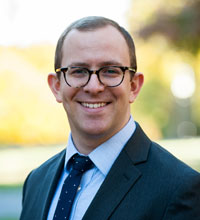Andrew J. Peterson Receives Fulbright Award
December 11, 2018 | Academics, Fellowships & Grants, Public, Students, Theology

Princeton Theological Seminary doctoral candidate
Andrew J. Petersonis in Tübingen, Germany on a Fulbright Scholarship where he is conducting research for his dissertation examining Christian accounts of sacrifice and forgiveness. Peterson is working with a team of international researchers at the University of Tübingen’s Institute for Ethics and Institute for Hermeneutics and Inter-Cultural Dialogue at the invitations of Drs. Christoph Schwöbel and Elisabeth Gräb-Schmidt.
Peterson’s thematic interests are driven by ecumenical and ethical concerns, as various Christian traditions have historically emphasized their differing views of how God graciously restores wayward humans to just fellowship with Godself. Protestants have tended to affirm that God restores a just relationship with Godself prior to the complete purification of Christians. Roman Catholics have tended to affirm the reverse, suggesting that while justice comes in degrees, a fully just relationship with God is only obtained after the complete purification of Christians.
Of these two views, however, Peterson finds the Protestant one more perplexing. Protestants claim that the relationship between God and humanity is made just even while humans are still unjust. His project is in many ways an attempt to make sense of this claim by examining and repairing the past accounts by Reformed Protestants of Christ’s atoning work. Of the various answers Protestants have typically offered, all involve a central set of claims about Christ’s sacrificial death and the nature of God’s forgiveness. And yet, the historically Reformed ways of talking about these things have become unfashionable, largely due to ethical concerns about the goodness of divine retribution and Christ’s sacrificial suffering.
As Peterson succinctly puts it, “What Christians think about Christ’s death has an enormous impact on the sorts of lives they strive to live themselves and recommend to others.” And yet Christ’s call to discipleship comes packaged with hardships of many kinds.
Living east of Eden as we do, loving others in the way Christ commends, often brings sacrifice and suffering. So how do we understand Christ’s suffering and our own in such a way that keeps toxic passivity at bay? With the help of especially Thomas Aquinas and Karl Barth, Peterson will continue his research into these questions this year in Tübingen.
Peterson’s year of research is supported by funding from the U.S. Department of State, the J. William Fulbright Foreign Scholarship Board, and the German Fulbright-Kommission in Berlin. He joins an elite group of academics chosen to conduct research for the 2018-2019 academic year through the Fulbright U.S. Student Program. The Fulbright Program is the flagship international educational exchange program sponsored by the U.S. government and is designed to build lasting connections between the people of the United States and the people of other countries. Recipients of Fulbright awards are selected on the basis of academic and professional achievement as well as their record of service and leadership potential in their respective fields.
Read more about Andrew Peterson’s research and view photos from his travels.





